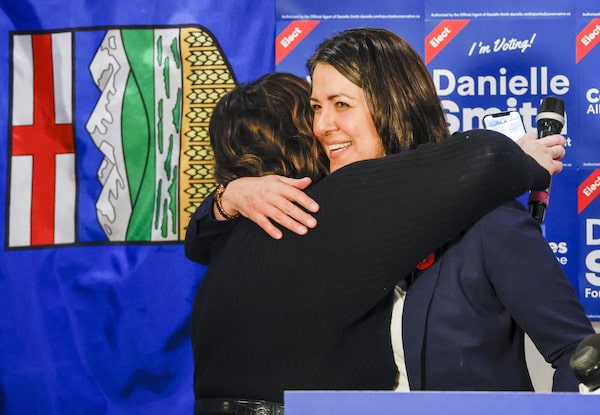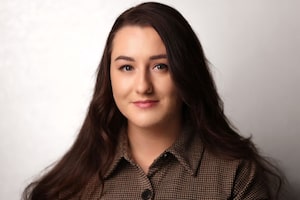
Alberta Premier Danielle Smith celebrates her win in a by-election in Medicine Hat, Alta., on Nov. 8.Jeff McIntosh/The Canadian Press
Alberta Premier Danielle Smith has won a by-election in Brooks-Medicine Hat, which will allow her to personally introduce her proposed sovereignty act after the legislature resumes at the end of the month.
The legislation, which has not been drafted, was the cornerstone of her successful campaign to lead the United Conservative Party and replace former premier Jason Kenney. Ms. Smith has promised that the bill, which she claims would give the province power to disregard federal laws that threaten Alberta’s jurisdiction, would be her government’s first piece of legislation when the House reconvenes on Nov. 29.
Ms. Smith called the by-election in Brooks-Medicine Hat, which is considered a safe UCP riding, the same day she was sworn into office as Premier last month after local MLA Michaela Frey stepped aside. The Premier had about 56 per cent of the vote late Tuesday night, with all but one poll reporting.
NDP candidate Gwendoline Dirk was in second place with 24 per cent, while Barry Morishita, former Brooks mayor and leader of the centrist Alberta Party, was third with 18 per cent. Two candidates running for independence parties together had less than three per cent.
“This is more than a victory party. This is the start of something bigger. This is our declaration that Alberta is worth fighting for,” Ms. Smith told supporters in Medicine Hat.
“And make no mistake: from what you saw from the results today, we certainly have a fight ahead of us.”
She reiterated that affordability, health care and the economy are priorities for the UCP heading into the general election, scheduled for next May. The NDP has identified many of the same priorities.
Ms. Smith’s competitors in the by-election were critical of Ms. Smith’s sovereignty act and ran on platforms that focused on stability, with promises to address challenges in the health care system and the growing affordability crisis. In her speech, Ms. Smith said she wants to move quickly to assert Alberta’s sovereignty.
Turnout for by-elections is typically much lower than general elections, which was the case on Tuesday, when just 30 per cent of eligible voters turned out.
In 2019, when the UCP took office, Ms. Frey won in a landslide with 61 per cent of the vote, more than 40 percentage points ahead of the second-place NDP candidate. Ms. Smith was on track to win with a smaller margin of victory, though she still had a substantial lead.
The by-election was significant not only because Ms. Smith needed a seat in the legislature, but also for what it might foreshadow about next spring’s election. Recent polls have suggested that Ms. Smith started her term in office as a deeply unpopular Premier, whose party has been trailing the Opposition New Democrats.
She has been criticized for the sovereignty act, as well as for focusing so heavily on the COVID-19 pandemic and vaccines. Tuesday marked the second major speech in which Ms. Smith did not mention vaccines since becoming premier.
Ms. Smith was forced to walk back comments she made on her first day as Premier, when she said the unvaccinated were the most discriminated group in her lifetime, and she also apologized for social media posts she wrote earlier this year that appeared to blame Ukraine for Russia’s invasion of the country.
The sovereignty act has been widely condemned by constitutional experts, and most of Ms. Smith’s leadership rivals – all but one of whom were given posts in cabinet – criticized it as illegal and dangerous during the campaign, as did Mr. Kenney. Ms. Smith has said she expects cabinet ministers to support the bill, unlike the rest of her caucus members, who may vote freely.
Ms. Smith softened her stand on the proposed legislation after she took office. She said Alberta will abide by decisions from the Supreme Court of Canada in rulings involving the act, a reversal of comments she made in September that the province would have the option to “carry forward” even if a court were to rule against the government.
Brooks-Medicine Hat was not the Premier’s first choice. Before formally entering the UCP race, she said she wanted to run in Livingstone-Macleod, which encompasses her home in High River and is staunchly conservative. The incumbent, Roger Reid, said he planned to run for re-election even after Ms. Smith emerged as his party’s new leader.
Instead, Ms. Frey resigned the day after Ms. Smith’s leadership victory and immediately threw her support behind Ms. Smith.
“After serving this constituency, I know that this Brooks-Medicine Hat needs a principled leader, someone who will fight for Alberta as well as listen, and respond, to the unique needs of Southeastern Albertans,” said Ms. Frey in her resignation letter. “Danielle’s vision will breathe new life into our region.”
Despite being three hours from home, Ms. Smith said during the by-election campaign that she was committed to spending more time in the area and that residents had similar concerns to those in her own riding.
Ms. Smith declined to call a concurrent by-election for Calgary-Elbow, a more progressive riding in Alberta’s largest city that has been without a representative since former UCP cabinet minister Doug Schweitzer stepped down at the end of August.
She said she opted to run in Brooks-Medicine Hat rather than Calgary-Elbow because she felt rural voices went unheard during the pandemic and argued it is too close to a general election to call another by-election. Critics noted that she risked losing in Calgary, which was held from 2015 to 2019 by the Alberta Party and which Mr. Schweitzer won with less than half of the votes.
It also turned out the position in Livingstone-Macleod did open. Mr. Reid unexpectedly withdrew from the nomination race last week after the deadline to enter the contest closed, leaving Nadine Wellwood as the lone remaining candidate for the UCP in the riding.
Ms. Wellwood revealed on Monday that the party rejected her candidacy over her social media activity. Ms. Wellwood has an extensive history on social media, including posts that compared vaccine passports to Nazi Germany, promoted ivermectin as a cure for COVID-19, and spread the conspiracy theory that U.S. President Joe Biden stole the 2020 election from former president Donald Trump.
Ms. Wellwood is supported by Take Back Alberta, or TBA, a populist organization opposed to vaccine mandates and public health restrictions. A slate of candidates backed by this group was recently elected to the UCP board, and the group’s leader has said the board elections were part of a larger plan to wield power in democratic institutions.
TBA is closely connected to people who were involved, or sympathized with, last winter’s border blockade in and around Coutts, Alta., and the convoy of vehicles that paralyzed downtown Ottawa and prompted the federal government to invoke the Emergencies Act, which is now the subject of a public inquiry.
 Alanna Smith
Alanna Smith Carrie Tait
Carrie Tait